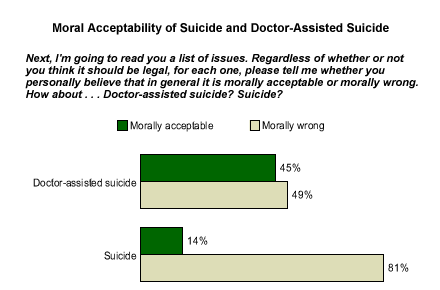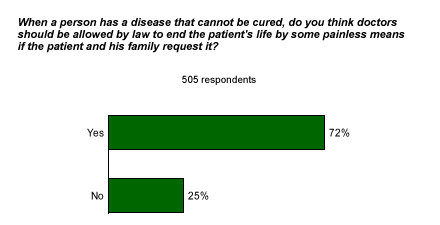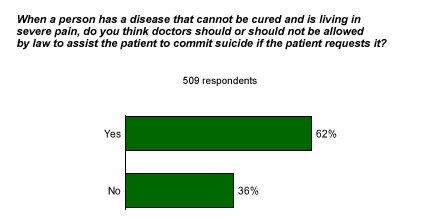If a young man suffering from a debilitating, incurable disease asks his doctor or a loved one to help him end his life, the doctor or loved one would likely go to jail for complying with his wishes. If that same young man takes his own life, it wouldn't be criminal in several states. Although illegal, Americans would find the first choice more morally acceptable than the second, legal activity. And, when asked, most Americans would support a law making his first choice legal. Legal issues and moral issues sometimes walk a blurred line.
Morality
In early May, Gallup asked Americans about the moral acceptability of several issues, including doctor-assisted suicide and suicide. In the May 5-7 poll*, Gallup asked whether doctor-assisted suicide is morally acceptable or morally wrong. Americans were somewhat divided, with 45% saying it is morally acceptable and 49% saying it is morally wrong. The difference in perceived moral acceptability of suicide per se was far more lopsided: 14% of Americans found it morally acceptable, and 81% found it morally wrong.

In an absolute sense, suicide, whether doctor-assisted or not, always involves the choice to end one's life. In many religious circles, it is therefore always an immoral choice if not an outright sin. But in publicized doctor-assisted suicides such as the Dr. Jack Kevorkian cases, the patient usually suffers from a debilitating disease and seeks to "die with dignity" using physician assistance. This type of death may be seen as merciful, and physician involvement implies some measure of propriety.
In looking at opinions on these two issues, those who identify themselves as conservatives are substantially less likely than either moderates or liberals to believe that doctor-assisted suicide is morally acceptable. Only 36% of conservatives find it morally acceptable, compared with 49% of moderates and 61% of liberals. Those who attend church on a weekly basis are considerably less likely to find doctor-assisted suicide morally acceptable than those who attend less often are.
Differences on the issue of suicide are slimmer between conservatives and moderates, and between those who attend church weekly or almost weekly. Liberals and those who seldom or never attend church are the most likely to find suicide morally acceptable.
Legality
In late May**, Gallup asked Americans one of two versions of a question about the legality of doctor-assisted suicide. The questions were similar, but each applied somewhat different conditions to the situation.
The first question asked, "When a person has a disease that cannot be cured, do you think doctors should be allowed by law to end the patient's life by some painless means if the patient and his family request it?" Seventy-two percent of Americans said yes and 25% said no.
Gallup also asked respondents, "When a person has a disease that cannot be cured and is living with severe pain, do you think doctors should or should not be allowed by law to assist the patient to commit suicide if the patient requests it?" With this wording, the percentage saying yes slips somewhat, even though this question explicitly mentions that the patient is living with severe pain. Sixty-two percent of Americans said it should be allowed, and 36% said it should not. The drop in support is most likely due to using the phrase "to commit suicide" as opposed to the more benign "end the patient's life by some painless means" in the first question.


Bottom Line
Although a majority of Americans consider suicide itself morally wrong, the public shows broad support for euthanizing terminal patients. However, the term "doctor assisted suicide" is one that carries somewhat negative connotations for a substantial number of Americans, and thus the public is divided when asked about its moral acceptability.
*Results are based on telephone interviews with 1,005 national adults, aged 18 and older, conducted May 5-7, 2003. For results based on the total sample of national adults, one can say with 95% confidence that the margin of sampling error is ±3%.
**Results are based on telephone interviews with 1,014 national adults, aged 18 and older, conducted May 19-21, 2003. For results based on the total sample of national adults, one can say with 95% confidence that the margin of sampling error is ±3%.
For results based on the 505 national adults in the Form A half-sample and 509 national adults in the Form B half-sample, the maximum margins of sampling error are ±5%.
